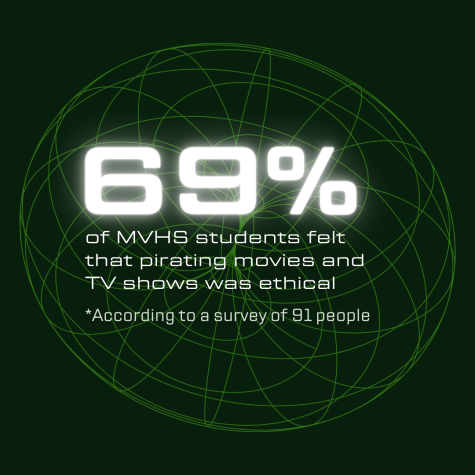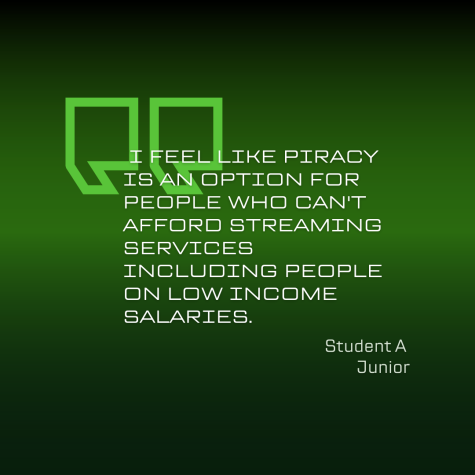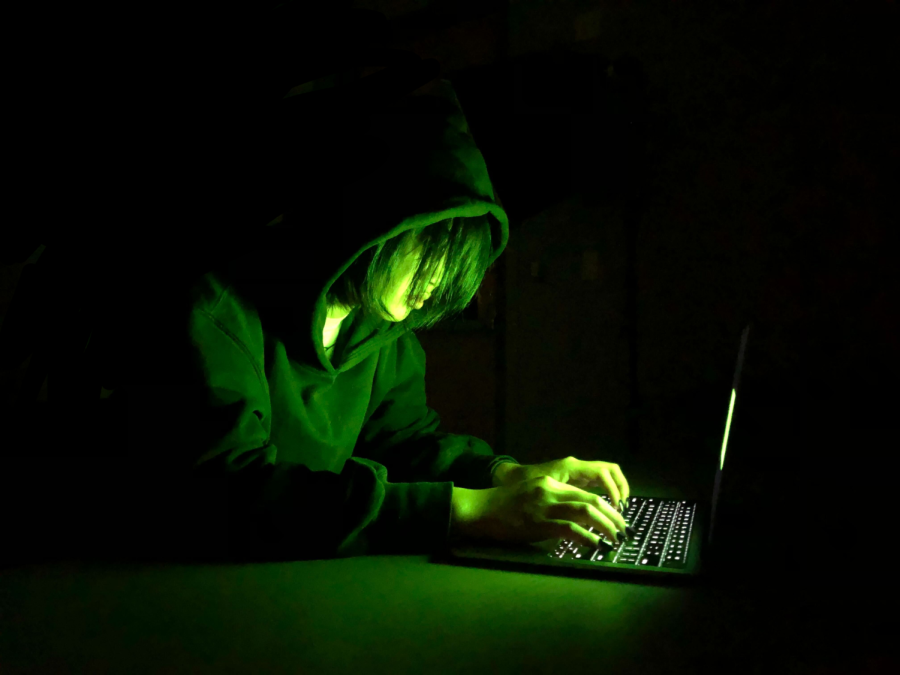Movie marauders
Examining the MVHS community’s personal experiences with pirating movies
Senior Mikaylah Du poses in front of a computer as someone who pirates content.
May 30, 2023
Besides streaming, renting and going to the movie theater, resorting to websites that use digital piracy is one of many options for media consumers. Piracy is the act of downloading or distributing copyrighted material without paying for it. In the early 1990s, digital piracy made its way through new technology, particularly the MP3 computer file that compressed data and allowed users to download copyrighted material and upload it onto the internet. Throughout the years, piracy has become increasingly common as overall viewership of pirated content hits an average of 230 billion views a year. Out of a survey of 103 students at MVHS, 69% admitted to copyrighting entertainment.

Sophomore Saanvi Goyal confesses to pirating entertainment and is an avid user of Soap2Day and 123Movies. Goyal finds that the convenience of not having to pay for a streaming service and the variety of the websites motivates her to pirate media such as the TV show “Young Sheldon.”
“It’s typically easier to just grab [entertainment] from Soap2Day than to have to go through actually having to buy all the content,” Goyal said. “With 123Movies, typically they’ll have the mainstream films two or three weeks after they get released. They have a lot of sports content and a good amount of TV shows that are fairly popular. It has a pretty wide range of content.”
Similarly, sophomore Rohin Garg and anonymous junior Student A, both admit to pirating content through Soap2Day and other domains for the convenience factor. Garg uses the platform to watch pirated sports content while Student A uses it to watch the TV show “Grey’s Anatomy.”

“I feel like piracy is an option for people who can’t afford streaming services including people on low income salaries,” Student A said. “It would just be easier for them to pirate since they can’t buy or purchase the content.”
Goyal agrees and notes the benefits: Not only do people who pirate get content for free but the implications of pirating aren’t expected. Goyal feels that although she knows she is accessing illegally obtained content, she doesn’t fear facing direct consequences.
As Goyal, Garg and Student A each use these websites, they have noticed the poor security and risks that accompany them. Garg and Student A say that frequent pop-up advertisements occur on “Soap2Day.” While Student A simply ignores them, Garg uses an ad blocker to work around these ads. To protect themselves from the poor security of these websites, they use a VPN to hide their browsing history. Since VPNs encrypt the user’s IP address, they prevent the user’s browsing activity from being monitored by their Internet Service Provider. In particular, Goyal has noticed other security risks and ensures that she practices safe measures while using Soap2Day.
“I don’t sign up for any accounts or anything like that,” Goyal said. “A lot of these sites will ask you for your credit card information even though it’s free. I try to keep my information anonymous and just use the guest setting on all these websites to prevent them from being able to have access to my information.”
Although Garg and Student A know they could face consequences for using these illegal streaming websites, their parents’ more lenient opinions on illegal streaming spare them some worry. For Garg’s parents, their only concerns are cybersecurity risks. Similarly, Student A notes that their parents don’t see the point in buying streaming services because they are deemed unnecessary if they already use pirating websites. However, Goyal’s parents don’t know she pirates content as they are more averse to piracy. Goyal’s parents have two streaming services and when they feel like watching a new movie release, they use Red Box or rent a DVD.
As each of these students are aware of the consequences of piracy, they are also aware of the ethical and moral dilemmas that accompany engaging in piracy. Goyal feels although piracy isn’t completely ethical, it doesn’t cause major harm and allows people to get access to content they’d have to pay for otherwise.

Furthermore, Garg and Goyal try to stray away from pirating content from smaller filmmakers that suffer more noticeable losses to piracy compared to larger, blockbuster-type films. Specifically, Goyal has noticed piraters on YouTube take advantage of smaller content creators.
“If you’re pirating things like big shows or big movies, it probably isn’t going to hurt the corporations that produce them that much,” Goyal said. “But for smaller films, for example, on YouTube, there are channels that will pirate movies from small filmmakers, and they’ll do 10-minute movie recaps and people watch that instead. I think that is probably ethically the worst kind of piracy.”
Garg agrees and feels the morality of people pirating movies depends on the context. Typically, he believes that if viewers want to view a smaller industry-level film, it’s worth it to buy the movie rather than to pirate. Although Goyal believes streaming websites can try to lower prices and offer smaller plans to media consumers so they don’t suffer significant losses due to piracy, Student A feels there is no solution.
“No one’s going to have a website where everything’s free legally, right?” Student A said. “In the context of capitalism, I highly doubt that solution would even exist.”



















